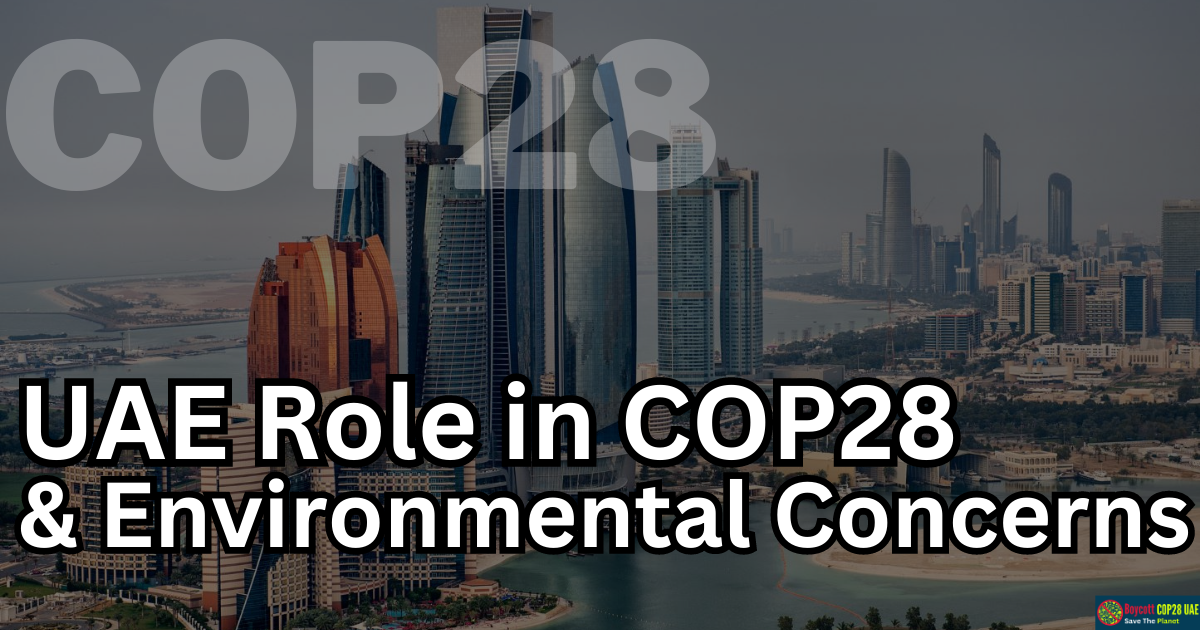The upcoming 28th Conference of the Parties (COP28) is set to be a pivotal moment in global efforts to combat climate change, aiming to bring nations together to address pressing environmental concerns. At the heart of this effort stands the United Arab Emirates (UAE), a nation with significant ties to the fossil fuel industry. Leading the COP28 charge is Sultan Al-Jaber, head of the Abu Dhabi National Oil Company (ADNOC), a move that has raised eyebrows due to environmental implications. This article delves into the UAE’s suitability for hosting COP28 and the implications of ADNOC’s carbon footprint.
UAE’s Role as COP28 Host: A Controversial Choice
The choice of the UAE as the host for COP28 has sparked debates about its suitability. While the nation has demonstrated its ambition to transition towards renewable energy sources, its heavy reliance on oil and gas remains a focal point. The irony of a fossil fuel-dependent country leading a conference aimed at reducing greenhouse gas emissions cannot be overlooked. Environmental groups, along with US and EU lawmakers, have expressed concerns about the UAE’s commitment to the conference’s objectives.
Sultan Al-Jaber’s Dual Role: A Conflict of Interest?
Sultan Al-Jaber’s appointment as the president of COP28 has added another layer of controversy. As the head of ADNOC, a major player in the fossil fuel industry, Al-Jaber’s dual role presents a potential conflict of interest. His responsibility to guide nations toward policies that limit global heating clashes with his role in a company deeply entwined with the production of emissions-intensive fossil fuels. This duality raises questions about the sincerity of the UAE’s commitment to addressing climate change.
ADNOC’s Emissions Disclosure: Scrutinizing The Numbers
ADNOC’s recent disclosure of emissions from its oil and gas production for the year 2022 sheds light on the carbon footprint of the company. However, a critical analysis reveals a limited perspective. The disclosed emissions, referred to as Scope 1 and 2, accounted for 24 million tonnes of CO2 equivalent. While ADNOC hailed this as an “industry-leading low carbon intensity achievement,” it’s important to note that these figures only scratch the surface of the company’s overall emissions.
Unveiling Scope 3 Emissions: The Hidden Reality
The true extent of ADNOC’s carbon footprint becomes evident when considering Scope 3 emissions, which encompass the pollution released when fossil fuels are burned for energy. These emissions constitute the lion’s share of an oil company’s carbon footprint. Shockingly, ADNOC’s Scope 3 emissions, estimated from production data by Rystad Energy, amount to over 340 million tonnes of CO2. This figure surpasses the annual emissions of the entire UK and is a staggering 14.1 times higher than the emissions disclosed by ADNOC for the same year.
UAE’s Oil Dependency: A Barrier to COP28 Goals
The UAE’s reliance on oil and gas production, despite its efforts to diversify its economy, remains a significant obstacle to the success of COP28. Transitioning away from fossil fuels is not only a monumental challenge for the country but also raises questions about its commitment to the conference’s objectives. Hosting COP28 in a nation so intricately linked to the fossil fuel industry casts doubt on the sincerity of the UAE’s intentions in combating climate change.
Conclusion: Rethinking the Platform for COP28
As the world prepares for COP28, it’s crucial to evaluate the suitability of the UAE as its host. While the nation has taken steps towards renewable energy, its continued heavy investment in the fossil fuel industry cannot be ignored. The appointment of Sultan Al-Jaber, a leader in a major oil company, as the head of COP28 raises concerns about conflicts of interest and the authenticity of the UAE’s commitment to reducing emissions. To ensure the effectiveness of COP28, the global community must reconsider whether a nation deeply entwined with the fossil fuel industry is the right platform to drive meaningful change in the fight against climate change.






